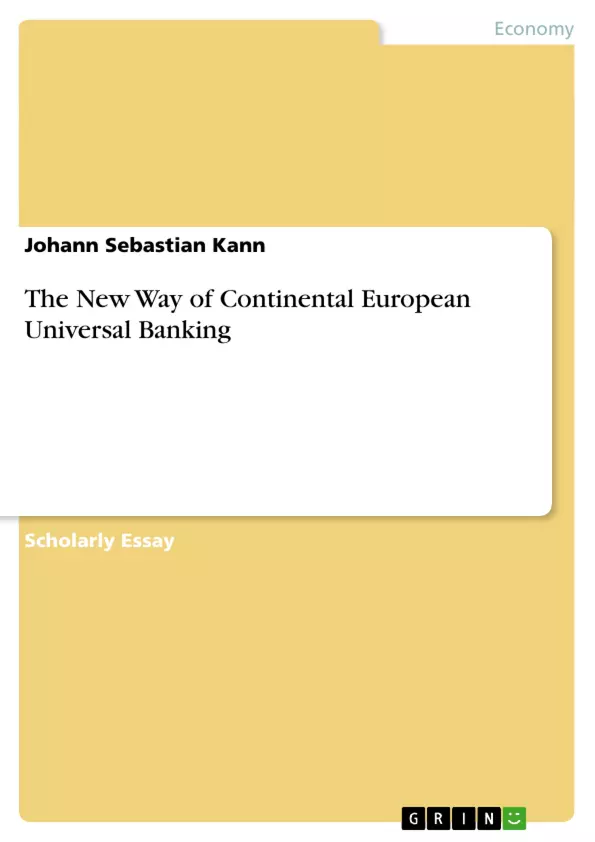The goal of this paper is to investigate how the European Banking environment has changed dramatically over the past years.
Based on new studies the author will present the Modern Financial Intermediation Theory from Allen and Santomero (2001) and Recent Banking Efficiency
Studies from Van Dijcke (2000) and Ali/ Gstaach (2000), in order to be able to derive new conclusions for the Continental European Universal
Banking System.
The paper presents a possible new structure of the European Banking System, which will show 3 major segments of local, national and
international Banks.
Finally the author will draw conclusions of such changes on the Monetary policy of the European Union.
Inhaltsverzeichnis (Table of Contents)
- Introduction
- Consolidation trend in the European Banking Industry.
- New structure of the European Banking Environment.
- Review of recent Financial Intermediation Theory
- Implications for the Monetary policy in the European Union.
- Summary..
- Outlook
- References
Zielsetzung und Themenschwerpunkte (Objectives and Key Themes)
This paper aims to investigate the significant changes within the European Banking environment over recent years. Utilizing contemporary research, the author will present the Modern Financial Intermediation Theory by Allen and Santomero (2001) and explore recent Banking Efficiency Studies by Van Dijcke (2000) and Ali/Gstaach (2000). These studies are used to derive new conclusions for the Continental European Universal Banking System. The paper proposes a new structure for the European Banking System, showcasing three distinct segments of local, national, and international Banks. The author will then analyze the impact of these changes on the Monetary policy of the European Union.
- Transformation of the European Banking environment.
- Modern Financial Intermediation Theory and its application to European Banking.
- Analysis of recent Banking Efficiency Studies.
- Proposed new structure of the European Banking System.
- Implications for the Monetary policy of the European Union.
Zusammenfassung der Kapitel (Chapter Summaries)
- The introduction highlights the profound changes in the Continental European financial services environment, driven by deregulation, financial integration, and technological advancements. It contrasts traditional and modern perspectives on the role of banks in the economy, emphasizing the importance of product innovation, distribution channels, and information technology in the future of European banking.
- This chapter explores the consolidation trend in the European Banking Industry. While predicting future consolidation is difficult, past efficiency studies in the EMU point to a need for cost containment, market restructuring, and alliances or mergers. The chapter examines the difference in consolidation between Investment Banking and Retail Banking and includes a table of European Banking Statistics.
Schlüsselwörter (Keywords)
The main keywords and focus topics of this paper include: European Banking, Financial Intermediation, Banking Efficiency, Universal Banking, Consolidation, Monetary Policy, Deregulation, Financial Integration, Technological Advancements, Product Innovation, Distribution Channels, Information Technology, Cost Containment, Market Restructuring, Investment Banking, Retail Banking, EMU (European Monetary Union).
Frequently Asked Questions
What is the Modern Financial Intermediation Theory?
Developed by Allen and Santomero (2001), it focuses on how banks add value through risk management and reducing participation costs rather than just traditional deposit-taking.
How is the European banking structure changing?
The system is consolidating into three major segments: local banks, national champions, and large international banking groups, driven by deregulation and technology.
What is the difference between Retail and Investment Banking consolidation?
Investment banking is highly globalized and consolidated, whereas retail banking remains more fragmented due to local regulations and customer habits, though it is also seeing a trend toward larger alliances.
What impact does banking consolidation have on EU monetary policy?
Consolidation affects the transmission mechanism of monetary policy, as larger, more efficient banks may respond differently to interest rate changes by the ECB.
Why is technological advancement crucial for universal banks?
Technology drives efficiency, enables new distribution channels (like online banking), and allows for faster product innovation, which is essential for maintaining competitiveness in the EMU.
- Quote paper
- Dr. Johann Sebastian Kann (Author), 2003, The New Way of Continental European Universal Banking, Munich, GRIN Verlag, https://www.grin.com/document/26096



